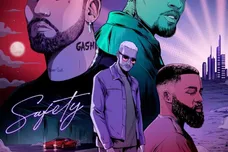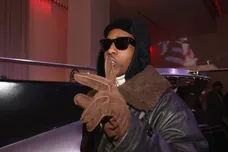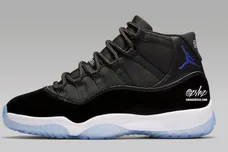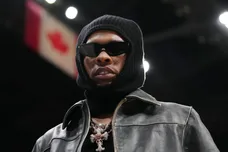As I was sifting through the list of Grammy nominees a couple weeks ago, I saw a lot of familiar names.
Eminem? Check.
Jay-Z? Of course.
Kanye West? This dude can’t stay off the list.
What stood out to me was that there was a whole new group of artists who were nominated this year. Drake is up for “Best New Artist.” B.O.B. is up for “Record of the Year.” Nicki Minaj, even though her album dropped after the deadline for nominations, managed to make the list for her collabo with Luda. When I saw that Chris Brown’s “Deuces” was also up for “Best Rap/Sung Collaboration,” my jaw dropped. That’s a record from Chris and Tyga’s “Fan Of A Fan” mixtape with DJ Ill Will & DJ Rockstar, which premiered right here on HotNewHipHop. Of course, all of these artists and songs deserve to be nominated for Grammys. But it finally dawned on me, after seeing this list of nominations, that maybe the mixtape had finally reached the mainstream audience.
I wanted to do a little digging and develop a theory on how the mixtape, and especially online mixtape buzz, has gone from being an outside promotional tool to being the force that can potentially send a song straight toward a Grammy nomination.
In my quest for the truth, I started by chatting with DJ Drama last week. He told me a little bit about what the mixtape game was like way before most of you reading this even knew what a mixtape was. Drama started doing mixtapes in the mid-90’s in Philly, following in the footsteps of pioneers like DJ Clue and Tony Touch. In the early days, mixtapes were as much a demonstration of DJ talent, whether it be scratching or mixing, as they were an outlet for the artists that lended their raps to them. For distribution, most of the time, DJs would sell their mixtapes hand to hand. “Back then, a lot of people would also sell a master copy to stores for 500-1,000 dollars, and the store would make their own copies to sell,” Drama said. In other words, these mixtapes were homegrown, and strictly for the biggest hip-hop heads. “It was a different type of hip-hop fan that was getting their hands on it. Back then, you just had to be cool, or have a homie that had mixtapes. But now, anybody can go online and get it.”
As Drama continued to shape the mixtape game along with DJs like Kay Slay and Whoo Kid, by the early 2000s mixtapes became more of a promotional, “strictly-for-the-streets” tool where artists would rap over beats that were hot at the time and deliver unofficial bootlegs that would show up at swap meets and on street corners. Rappers like 50 Cent, Cam’ron, and later, Lil Wayne, would use these tapes to maintain a street-level buzz while they worked the mainstream with major label releases. It was a great move because it allowed the artists to cater to two different fanbases. However, the music industry wasn’t too happy about DJs or bootleggers selling these mixtapes, which included their copyrighted beats on them, without getting a piece of the action themselves.
Meanwhile, the internet had become an amazingly powerful tool for bootlegging music. It didn’t take long for some genius to start bootlegging these bootleg mixtapes too and spread them around underground channels for online heads to download. I remember listening to the 50 Cent “G-Unit Radio” mixtape series back in the day, and I’ve never been to New York to buy a hard copy at a corner store. Thanks, broadband internet!
But it didn’t take long for these cultures to fuse into something positive and very potent. A light went off the mind of KP, co-founder and operator of the mixtape website DatPiff.com, around this time, and he wanted to do something about it. “It was definitely at a point where something needed to change, because mixtapes were starting to get a bad rep and viewed by many as ‘illegal.’ I don’t think anyone envisioned how vital the internet would become in regards to the transformation from basically an ‘illegal street market’ to a worldwide accepted and encouraged viral market.” Whether or not KP saw what he was about to do when he first started DatPiff, he was about to pave the way for a whole new attitude toward the mixtape to start brewing in the music industry.
It didn’t take long for online fans to take notice, and for the artists to catch on as well and provide what the fans wanted. Pretty soon, fans had more free music than they knew what to do with, and a new era was born. DJ Ill Will was one of the first mixtape DJs to focus almost exclusively on internet-based mixtapes rather than selling hard copies on the streets, and the payoff was huge. “To be honest, it was just a more cost effective way to get to more ears. At first I received a lot of flack from the mixtape community. I was even labeled an "Internet DJ" early on in my career. But I became arguably one of the pioneers in the digital downloading game, which is pretty much the industry standard now.”
The writing was on the wall. The mixtape, namely mixtape promotion online, was the wave of the future. The bottom line was this: these online mixtapes and leaks reach a core group of hip-hop fans that are especially important to the culture. If you’re reading this article right now, you’re in the core group. Chances are, you’re the guy or girl who knows the most about music in your group of friends and tells everyone about the hot new records. You’re what marketing people like to call “the early adopters” – the 13.5 percent of the population that are the key for any new product to be accepted by the masses. You can think of guys like DJ Ill Will, DJ Drama, and DJ Skee, in their promotional role, as YOU on steroids. While you’ll share your music taste with your group of 20 friends, they share their taste with millions of “friends” who wait to hear what they think is hot.
This new “mixtape outlet” for promotion allowed any new rapper to just “do a mixtape” as his demo and get started from there. That’s how all new rappers start now. No one just comes out of nowhere. They put out mixtapes, and if we like them online, they’ll garner attention from the majors and rise to the top from there. That’s where you got artists like Drake, Nicki Minaj, and Wiz Khalifa. “It’s a whole new breed, which is crazy,” adds DJ Drama. Watching these mixtape artists grow into superstars amazes him. “I’d still be doing this, even if I weren’t making money at it,” he told me.
In the past couple years, the music you hear on mixtapes has grown past the gritty, street oriented genre too. Ill Will remembers his choice to embrace softer-sounding artists such as Drake and Trey Songz on his popular “I Love Your Girl” Series. “It wasn't planned out, but I found an open lane and pushed it by doing R&B and pop mixtapes before they were cool. At that point, street tapes pretty much dominated the game.”
What do the record labels think of the artists who dominate this culture? They’re eating it up. Sign ‘em! Accept ‘em! Put them in Entertainment Weekly. Put Nicki Minaj on “Regis & Kelly” to get her ass slapped. They’re now today’s stars. They’re self-selected completely, by you, with the facilitation of the mixtape DJs and the blog sites you visit, and the record companies are happy because they can now sign the artists that they know the fans already like.
Beyond the DJ, the mixtape, or the blog sites, this new era of music domination works out so well because we, the fans, are now in the driver’s seat. This new shift has given us more power than I bet you’ve realized until now. You have to remember, the old method was that the record company would feed us whatever they wanted, and the songs we liked the most from what they presented to us (via radio and MTV) would be the hits of the year.
Now, in 2010, we pick what we like from our Firefox window. Everyone starts out unsigned. We hear about them first through blog sites and on mixtapes from our favorite DJs, and if they become popular enough from there, then the record companies will sign them. The game has been flipped on its head.
The result of living in this mixtape era is that we’ve effectively been given the keys to the music industry to dictate what’s popular. And guess what? Our selections have now been honored by the Grammys in the form of all these nominations. Take a bow, online hip-hop community. Your taste is impeccable.
I’ll be back next week with something else to talk about. As always, hit me on Twitter or e-mail me with suggestions and feedback. By the way, shouts out to Davis, the winner of our “Detox” contest from a couple weeks back. What’s the fifth and final ingredient Dr. Dre needs to include to make “Detox” a classic? Here’s Davis’s answer:
5. Delivery:
“What I've seen to be the most important thing about an album being a success is how it's delivered. Dre needs to give his music to us in a whole new way, so that we feel a part of it and need “Detox.” Dre has the whole world waiting for him to drop it, so we will follow him no matter what crazy stuff he comes up with. Dre, please do something different to rock our world with your music! I hope he doesn't just set a release date, and then “Boom,” we have it. I want to remember the process of how I listened to “Detox” for the first time and why it is so special to me. What's music without passion? DELIVER us passion.”
I’ll see you guys next week. Peace!









